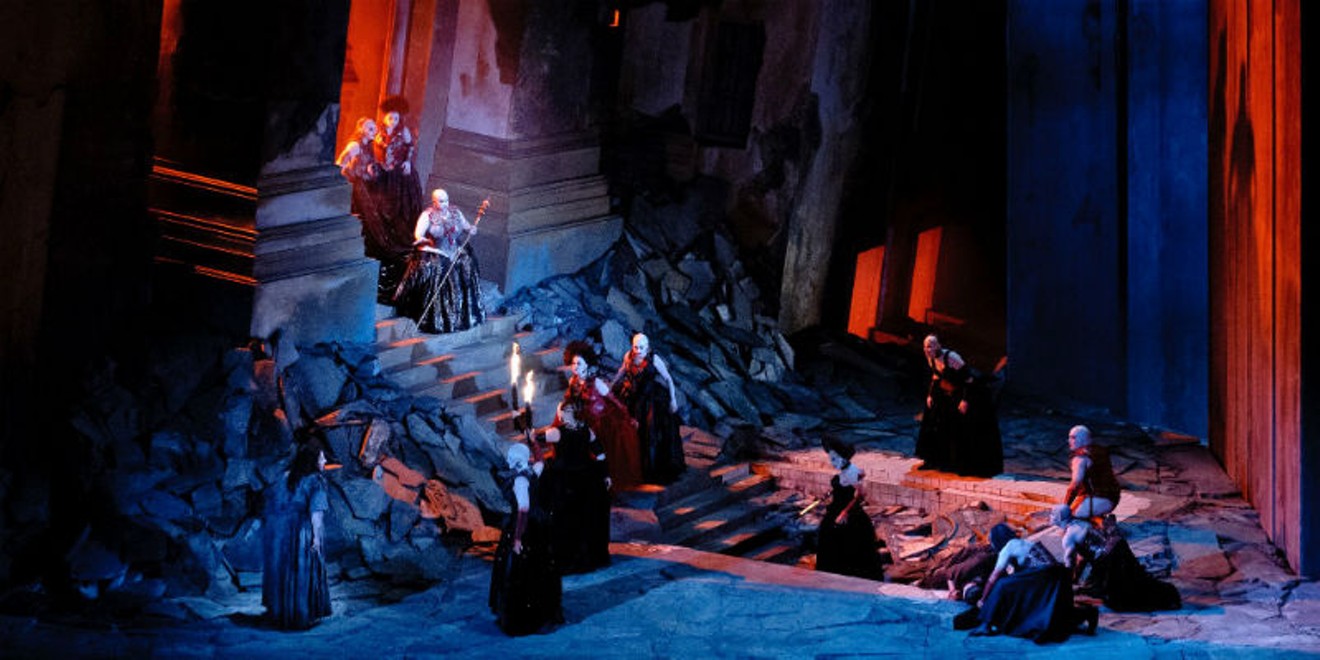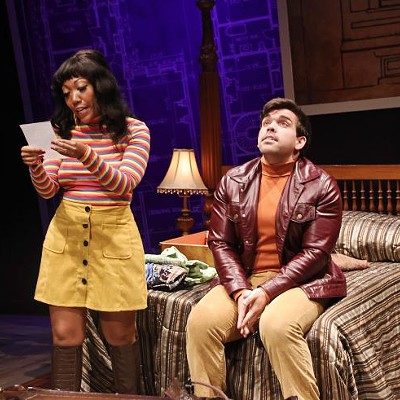The only thing missing from Houston Grand Opera's superlative rendition (via Chicago Lyric Opera) of Richard Strauss and Hugo von Hofmannsthal's titanic Elektra (1909) is the orchestra.
In a telling, but apocryphal, tale from the Dresden rehearsals, Strauss berated maestro Ernst von Schuch: “The orchestra's not loud enough, I can still hear the singers!”
While we ring grateful kudos to HGO's management for conjuring an opera space out of the cavernous George R. Brown Convention Center, after its home base, the Wortham Theater Center, was, and still remains, devastated after Hurricane Harvey, the decision to place the orchestra behind the “stage” remains dubious at best. At worst, in this case where the massive force of Strauss's gargantuan orchestra is terribly dimmed, we lose much of the opera's inherent cataclysm and psychological nuance. Far off in the background, we glimpse maestro Patrick Summers as if through the wrong end of a telescope. That's also how we hear the music, filtered and distant as if from granny's gramophone. If ever an opera needs and demands full and booming stereoscopic sound, it's Elektra.
The singing itself is magnificent and nonpareil. Radiant soprano Christine Goerke, today's reigning interpreter of Brünnhilde, is smashingly effective as vengeful princess in the House of Atreus. She never leaves the stage in this one-act masterpiece and dominates the action with a chillingly effective portrait of a woman gone mad. She sings with the demented fervor that defines Greek myth. The role is a killer in more ways than plot, which is why this opera is rarely performed. She totes her loyalty to her dead father like Atlas carrying the weight of the world. She has one overwhelming desire – to see her mother and Aegisth dead. This blood lust consumes her, and master composer Strauss and librettist Hofmannsthal give her ample opportunity to wade through Freudian complications toward her triumphant final dance of death. Degraded and kept virtual prisoner in the palace, she's both wild Fury and dutiful daughter, and there's never a moment when Goerke isn't a commanding presence. It's a splendid performance in every way, another touchstone in Goerke's continuing career of conquest.
Her beloved father, Agamemnon, hero of the Trojan war, has been slaughtered in his bath
by wife Klytaemnestra (mezzo-soprano Michaela Martens, in a superlative HGO debut) and her drunken lover Aegisth (tenor Chad Shelton). Daughter Chrysothemis (soprano Tamara Wilson) wants none of Elektra's bloody plot, only to forget everything that's happened and find a comfortable life of tranquil domesticity. Their brother Orest (masculine bass-baritone Greer Grimsley), whom Elektra anxiously awaits to carry out “the deed,” has been exiled and reported dead.
But she will not be deterred. If there's no man to do murder, she will. In one of Strauss' most picturesque descriptions, she digs up the axe that was used to kill her father and brandishes it like a holy relic. And then, in strides “the stranger.” He is here to confirm Orest’s death. At first, neither sibling recognizes the other, but slowly, through Strauss' magical, transformative music, brother and sister are united. It is one of the most moving scenes in any opera, punctuated by a lilting lullaby motif that's spellbindingly affective. Grimsley, perhaps America's greatest Wotan, has presence to spare and a lustrous dark sheen that overlays Orest with a warrior's vigor allied with ardent brotherly love.
As wonderful as all the principals are, it is newcomer Martens who can be said to steal the show as ravaged queen Klytaemnestra, eaten from the inside by guilt. Usually the role is played by a diva a bit past her prime, who may or may not be able to navigate smoothly through Strauss' shifting atonalities, coming across as shrill gorgon or hag. Hofmannsthal describes her as having a “wan and bloated face,” leaning upon an ivory walking stick, with her body encrusted with amulets, bracelets, and rings to ward off evil spirits. Here, though dressed in high Renaissance goth and strikingly bald (like her serving wenches), this queen of Mycenae is dangerously vigorous. While paralyzed by nightmares over Agamemnon's murder, Martens is a formidable foe, and her confrontation scene with Elektra is replete with orchestral exposition that's serpentine and wormy-sounding – music from a depraved hell. She may be paranoid, but as Martens sings her, don't ever cross her. She's nuts and evil.
When the orchestra manages to cut through the distant background, we can hear maestro Summers' exceptional command and respect. The expressionistic score, years before Stravinsky's ground-breaking Rite of Spring, is bathed in Strauss' idiosyncratic lush textures, exquisitely precise tone painting, rich chromatic harmonies, and glorious climaxes, all at the service of a piercing psychological drama that conveys Elektra's twisted, yet laser-focused, mind.
Like his preceding Salome (1905), Elektra caused quite a ruckus, and its “modern” music was invariably described by the blue hairs as debauched, twisted, exceedingly noisy, or filthy. It still shocks. But its insights are eternal. There's nothing in the rep that sounds anything like Richard Strauss at his most inspired. Directed by David McVicar, with dystopian sets and costumes by John Macfarlane that reek of Mad Max meets 300, and shaft-like Doric column lighting by Jennifer Tipton, HGO delivers this 20th-century masterpiece with blockbuster power, evocative staging (the bleeding staircase at the finale is a startling coup de theatre), and sublime singing. Except for that far-away orchestral accompaniment, does opera get any better?
Elektra continues at 7:30 p.m. January 27, 31, and February 2; and 2 p.m. January 21. HGO Resilience Theater at the George R. Brown Convention Center, 1001 Avenida De Las Americas. For information, call 713-228-6737 or visit hgo.org. $25- $325.
Support Us
Houston's independent source of
local news and culture
account
- Welcome,
Insider - Login
- My Account
- My Newsletters
- Contribute
- Contact Us
- Sign out
Elektra and its Tale of All-Consuming Blood Lust Has Blockbuster Power
D. L. Groover January 20, 2018 11:59AM

A grand and bloody production.
Photo by Robert Kusel
[
{
"name": "Related Stories / Support Us Combo",
"component": "11591218",
"insertPoint": "4",
"requiredCountToDisplay": "4"
},{
"name": "Air - Billboard - Inline Content",
"component": "11591214",
"insertPoint": "2/3",
"requiredCountToDisplay": "7"
},{
"name": "R1 - Beta - Mobile Only",
"component": "12287027",
"insertPoint": "8",
"requiredCountToDisplay": "8"
},{
"name": "Air - MediumRectangle - Inline Content - Mobile Display Size 2",
"component": "11591215",
"insertPoint": "12",
"requiredCountToDisplay": "12"
},{
"name": "Air - MediumRectangle - Inline Content - Mobile Display Size 2",
"component": "11591215",
"insertPoint": "4th",
"startingPoint": "16",
"requiredCountToDisplay": "12"
}
,{
"name": "RevContent - In Article",
"component": "12527128",
"insertPoint": "3/5",
"requiredCountToDisplay": "5"
}
]
KEEP THE HOUSTON PRESS FREE...
Since we started the Houston Press, it has been defined as the free, independent voice of Houston, and we'd like to keep it that way. With local media under siege, it's more important than ever for us to rally support behind funding our local journalism. You can help by participating in our "I Support" program, allowing us to keep offering readers access to our incisive coverage of local news, food and culture with no paywalls.
D.L. Groover has contributed to countless reputable publications including the Houston Press since 2003. His theater criticism has earned him a national award from the Association of Alternative Newsmedia (AAN) as well as three statewide Lone Star Press Awards for the same. He's co-author of the irreverent appreciation, Skeletons from the Opera Closet (St. Martin's Press), now in its fourth printing.
Contact:
D. L. Groover
Trending Arts & Culture
- Mayerling: A Dark Story With Beautiful Dancing Returns to Houston Ballet
- Climbing Into Comedy at Main Street Theater with Alan Ayckbourn's Taking Steps
- Top 5 Sickest Stephen King Sex Scenes (NSFW)
-
Sponsored Content From: [%sponsoredBy%]
[%title%]

Don't Miss Out
SIGN UP for the latest
arts & culture
news, free stuff and more!
Become a member to support the independent voice of Houston
and help keep the future of the Houston Press FREE
Use of this website constitutes acceptance of our
terms of use,
our cookies policy, and our
privacy policy
The Houston Press may earn a portion of sales from products & services purchased through links on our site from our
affiliate partners.
©2024
Houston Press, LP. All rights reserved.





